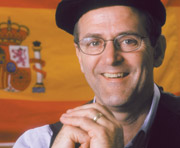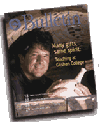
Dean Rhodesassistant professor of Spanish, 2001-presentBy Rachel LappDuring SST in Nicaragua, Dean Rhodes was “Latinized” – and he started on a faith journey combinings a passion for the Spanish language and people with service and teaching. Rhodes first experienced the “hospitality, graciousness, relaxed way of looking at life” of Latin people when in Nicaragua in 1968 with faculty leader H. Clair ’33 and Florence Badertscher Amstutz ’35. He found returning to campus more difficult than he anticipated, so when a fellow SSTer told Rhodes about the devastation in Peru as the result of an earthquake – 70,000 people had been killed – he took the opportunity. While he enjoyed his Goshen experience, it was a good time to take a break; Rhodes was apprehensive about his future as a social work major. “Those were good years because of the professors – like Mary Oyer, Atlee Beechy, Frank Bishop,” he said. “And I found it stimulating to be around people who had other backgrounds, other experiences. I never duplicated that at the universities I later attended.” In Peru, Rhodes reconnected with the service mindset of SST. “There was so much need there that it was easy to feel useful there,” he said. “It was later that I also discovered that you don’t always have to ‘do’ anything; sharing, smiling and entering into the lives of others – even if you don’t make their lives better – is important.” Rhodes wanted to return to Goshen after voluntary service, but finances landed him at the University of Iowa where he majored in Spanish education and history, before teaching several years at Iowa Mennonite School. Then Rhodes had another opportunity to return to Latin America, this time to Peru, with Wycliff Translators and Mennonite Central Committee. He worked in bilingual education and community development and served as a liaison to the Peruvian government – roles that often meant building bridges inside and outside the country. “It was a mixture of grassroots and government. I would work with barefoot teachers in the Amazon; I canoed to a lot of villages,” said Rhodes. “Then I had to scramble to find a tie to entertain diplomats.” Wycliff’s goal was Bible translation, yet literacy and community development were also deep concerns. “We worked holistically – encompassing spiritual, economic and social development – in preparing people for the onslaught of civilization. To preserve indigenous environments, we had to find ways to bridge the tension of the 20th century and tribal life in the face of oil and mining causes and the Trans-Amazon highway.” Rhodes said his SST and MCC experiences were life-changing because his “faith was united with service in positive ways” and his “eyes were opened to racial and ethnic disparities” that exist in every country. Rhodes returned to the United States in June of 1980, teaching at IMS and farming on the side while his family – including three sons – grew. He also completed a master’s degree in Spanish at Coe College (Cedar Rapids, Iowa). “I enjoyed my colleagues at IMS very much, and the energy and spontaneity of high school students,” Rhodes explained. “Starting in 1993, I planned itineraries and led student groups to different countries – Peru, Venezuela, Costa Rica, Guatemala, Mexico, Spain and Honduras. We did things tour groups could never do, like making rafts from balsa trees and floating down the river in Peru’s Amazon, or trekking in the Andes or camping on the beach in Venezuela. The joy of seeing these Midwestern kids discovering and learning overseas was tremendous.” He patterned the experiences, though shorter, after SST. Service was a part of those high school trips – whether students would clean, sing a capella on street corners or give a puppet show to children. Rhodes’ positive experiences at GC and his appreciation of its international connections brought him back as an instructor. As a language teacher, he finds ways to get to know students at many different levels. “While we are doing reflexive verb studies, we might ask questions, like ‘What time do you get up?’ or ‘How many brothers and sisters do you have?’ – questions other professors wouldn’t have opportunity to ask,” Rhodes said. “I see so much value here and mentoring that takes place. You can deal with so many of the ‘real’ issues, issues that matter, like peace and justice, women’s issues and considerations of race. To prepare for life, there is much more than academic preparation.” Because Rhodes feels that his Spanish teaching came about through faith, he said, “It is only natural to share it in the classroom. Faith is not something you exhibit in some contexts and not in others. I hope my students sense that in my respect for them and my interest in never diminishing their personhood. I hope that is reflected in my whole being.” |
| Top of page |


